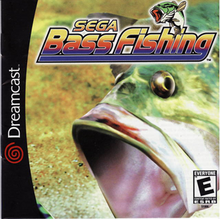
A game controller, gaming controller, or simply controller, is an input device or input/output device used with video games or entertainment systems to provide input to a video game. Input devices that have been classified as game controllers include keyboards, mice, gamepads, and joysticks, as well as special purpose devices, such as steering wheels for driving games and light guns for shooting games. Controllers designs have evolved to include directional pads, multiple buttons, analog sticks, joysticks, motion detection, touch screens and a plethora of other features.
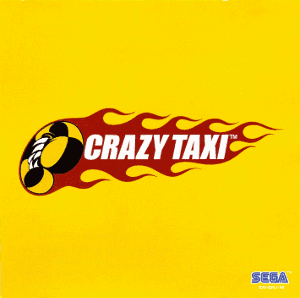
Crazy Taxi is a racing video game developed and published by Sega. It is the first game in the Crazy Taxi series. The game was first released in arcades in 1999 and then was ported to the Dreamcast in 2000. Gameplay is based on picking up taxi customers and driving to their destination as quickly as possible. Reception to Crazy Taxi has been mostly positive. It was ported to other platforms numerous times, including the PlayStation 2 and GameCube by Acclaim in 2001, and then Windows in 2002.

Columns is a match-three puzzle video game released by Sega in 1990. Designed by Jay Geertsen, it was released by Sega for arcades and then ported to several Sega consoles. The game was subsequently ported to home computer platforms, including the Atari ST.

ChuChu Rocket! is an action puzzle game developed by Sonic Team and published by Sega. Released for the Dreamcast in 1999, it was the first game for the system to support online console gaming. Players must place arrows on a board to lead mice into escape rockets while avoiding cats. The game features single-player modes in which a player must save all the mice on a board, and a multiplayer mode in which players battle to collect the most mice.
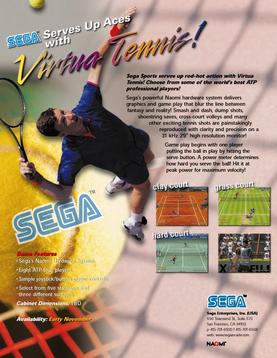
Virtua Tennis, known in Japan as Power Smash, is a 1999 tennis arcade game created by Sega AM3. The player competes through tennis tournaments in an arcade mode. It was ported to the Dreamcast in 2000, and to Windows in 2002. A Game Boy Advance version was also released in 2002, followed by an N-Gage version in 2003. For the home console market, the game was expanded with the introduction of the campaign mode.

Samba de Amigo is a rhythm game developed by Sonic Team and published by Sega. The game was released in arcades in December 1999, and for the Dreamcast video game console in 2000. A port for the Wii was also developed by Gearbox Software and Escalation Studios and released in 2008. Samba de Amigo draws on Latin American culture and its gameplay involves the player using controllers shaped like maracas to match a series of patterns displayed on-screen. The music is made of primarily popular Latin music songs rather than common or traditional samba. The game also features non-Latin pop songs.
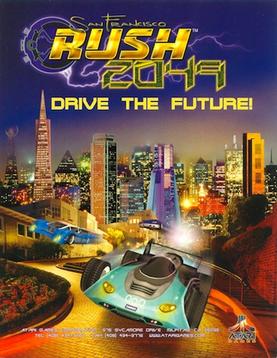
San Francisco Rush 2049 is a racing video game developed and manufactured by Atari Games for arcades. It was ported to the Nintendo 64, Game Boy Color, and Dreamcast by Midway Games West. The arcade machine was released in 1999; home versions followed in 2000 on September 7 for North America and November 17 for Europe. It is the third game in the Rush series and the sequel to San Francisco Rush: Extreme Racing and Rush 2: Extreme Racing USA. It is the last game in the Rush series to be set in the city of San Francisco and the last released on a Nintendo console. It also serves as the final game for the Atari Games label, which was retired shortly after the arcade release. The Dreamcast version was later re-released as part of Midway Arcade Treasures 3 for the PlayStation 2, Xbox, and GameCube and later for Windows as part of Midway Arcade Treasures Deluxe Edition.
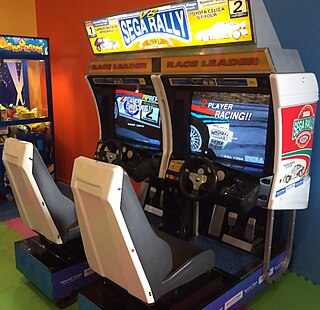
Sega Rally is a series of 3D racing video games published by Sega. The first game in the series, Sega Rally Championship, was developed by Sega AM3 and released in arcades in 1994. Later games were developed by Sega and Sega Racing Studio.
A multitap is a video game console peripheral that increases the number of controller ports available to the player, allowing additional controllers to be used in play, similar to a USB hub or a power strip. A multitap often takes the form of a box with three or more controller ports which is then connected to a controller port on the console itself.
Cyber Troopers Virtual-On is a series of video games created by Sega AM3. The series was created by Juro Watari. The original series was first published for arcades in January 1996. The game features fast, action-oriented gameplay requiring quick reflexes. It has seen five installments to date and has been ported to several video game consoles.

Hydro Thunder is an arcade inshore powerboat racing video game originally released by Midway Games in February 1999 and later released for the Sega Dreamcast as a launch title later that year. It was also released for the PlayStation and Nintendo 64 in early 2000. This game is part of Midway's Thunder series of racing games, which includes Offroad Thunder, 4 Wheel Thunder, and Arctic Thunder. Hydro Thunder Hurricane, a sequel to Hydro Thunder, was later released for the Xbox 360 on July 27, 2010 on Xbox Live Arcade.

Forgotten Worlds, titled Lost Worlds in Japan, is a side-scrolling shooter video game by Capcom, originally released as a coin-operated arcade game in 1988. It is notable for being the first title released by Capcom for their CP System arcade game hardware.
Super Monkey Ball is a series of arcade platform video games initially developed by Amusement Vision and published by Sega. The series debuted in 2001 with the arcade game Monkey Ball, which was ported to GameCube as Super Monkey Ball later that year. Several sequels and ports have been released.

Reel Fishing is a series of fishing video games by Natsume Inc. The first game, Reel Fishing, was released for the PlayStation in 1996. Originally a localization of Victor Interactive Software's Fish Eyes series from Japan, Natsume Inc. has since diverged from that series to create their own games.

Dreamcast Collection is a video game compilation developed and published by Sega for the Xbox 360 and Microsoft Windows, with each game included being a remastered version of its original release. A PlayStation 3 version was planned but was scrapped for unknown reasons. The original compilation included four of the best-selling video games for the Dreamcast. Although each of the games by themselves all received positive reviews, the original compilation received mostly mixed to negative reviews and was heavily criticized for the compilation's game selection. The 2016 version was met with a larger positive reception, particularly for the inclusion and remaster of Jet Set Radio.
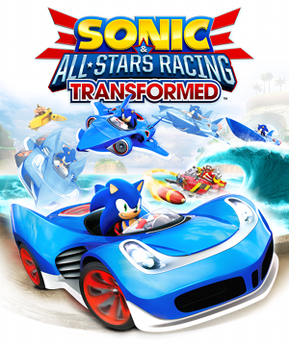
Sonic & All-Stars Racing Transformed is a kart racing video game developed by Sumo Digital and published by Sega. It was released for the PlayStation 3, Xbox 360, and Wii U in November 2012; for PlayStation Vita in December 2012; for Windows in January 2013; for Nintendo 3DS in February 2013; and for Android and iOS devices in January 2014. The PS3 and Wii U versions of the game were released in Japan on May 15, 2014.

Marvel Avengers: Battle for Earth is a video game developed by Ubisoft Quebec and published by Ubisoft for the Xbox 360 and the Wii U. The game is heavily based on the "Secret Invasion" storyline in Marvel comic books. The game was announced after the cancellation of the original The Avengers game based on the 2012 film of the same name, being developed by THQ. Battle for Earth was released in North America on October 30, 2012 for the Xbox 360, followed by the Wii U version on December 4. It was the first and currently only Marvel video game to be published by Ubisoft.

Majesco Entertainment Company is an American video game publisher and distributor based in Hazlet, New Jersey. The company was founded as Majesco Sales in Edison, New Jersey in 1986, and was a privately held company until acquiring operation-less company ConnectivCorp in a reverse merger takeover, becoming its subsidiary and thus a public company on December 5, 2003. ConnectivCorp later changed its name to Majesco Holdings Inc. on April 13, 2004.
